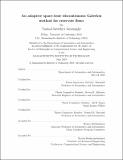An adaptive space-time discontinuous Galerkin method for reservoir flows
Author(s)
Jayasinghe, Yashod Savithru.
Download1121180544-MIT.pdf (13.74Mb)
Other Contributors
Massachusetts Institute of Technology. Department of Aeronautics and Astronautics.
Advisor
David L. Darmofal.
Terms of use
Metadata
Show full item recordAbstract
Numerical simulation has become a vital tool for predicting engineering quantities of interest in reservoir flows. However, the general lack of autonomy and reliability prevents most numerical methods from being used to their full potential in engineering analysis. This thesis presents work towards the development of an efficient and robust numerical framework for solving reservoir flow problems in a fully-automated manner. In particular, a space-time discontinuous Galerkin (DG) finite element method is used to achieve a high-order discretization on a fully unstructured space-time mesh, instead of a conventional time-marching approach. Anisotropic mesh adaptation is performed to reduce the error of a specified output of interest, by using a posteriori error estimates from the dual weighted residual method to drive a metric-based mesh optimization algorithm. An analysis of the adjoint equations, boundary conditions and solutions of the Buckley-Leverett and two-phase flow equations is presented, with the objective of developing a theoretical understanding of the adjoint behaviors of porous media models. The intuition developed from this analysis is useful for understanding mesh adaptation behaviors in more complex flow problems. This work also presents a new bottom-hole pressure well model for reservoir simulation, which relates the volumetric flow rate of the well to the reservoir pressure through a distributed source term that is independent of the discretization. Unlike Peaceman-type models which require the definition of an equivalent well-bore radius dependent on local grid length scales, this distributed well model is directly applicable to general discretizations on unstructured meshes. We show that a standard DG diffusive flux discretization of the two-phase flow equations in mass conservation form results in an unstable semi-discrete system in the advection-dominant limit, and hence propose modifications to linearly stabilize the discretization. Further, an artificial viscosity method is presented for the Buckley-Leverett and two-phase flow equations, as a means of mitigating Gibbs oscillations in high-order discretizations and ensuring convergence to physical solutions. Finally, the proposed adaptive solution framework is demonstrated on compressible two-phase flow problems in homogeneous and heterogeneous reservoirs. Comparisons with conventional time-marching methods show that the adaptive space-time DG method is significantly more efficient at predicting output quantities of interest, in terms of degrees-of-freedom required, execution time and parallel scalability.
Description
This electronic version was submitted by the student author. The certified thesis is available in the Institute Archives and Special Collections. Thesis: Ph. D., Massachusetts Institute of Technology, Department of Aeronautics and Astronautics, 2018 Cataloged from student-submitted PDF version of thesis. Includes bibliographical references (pages 205-216).
Date issued
2018Department
Massachusetts Institute of Technology. Department of Aeronautics and AstronauticsPublisher
Massachusetts Institute of Technology
Keywords
Aeronautics and Astronautics.